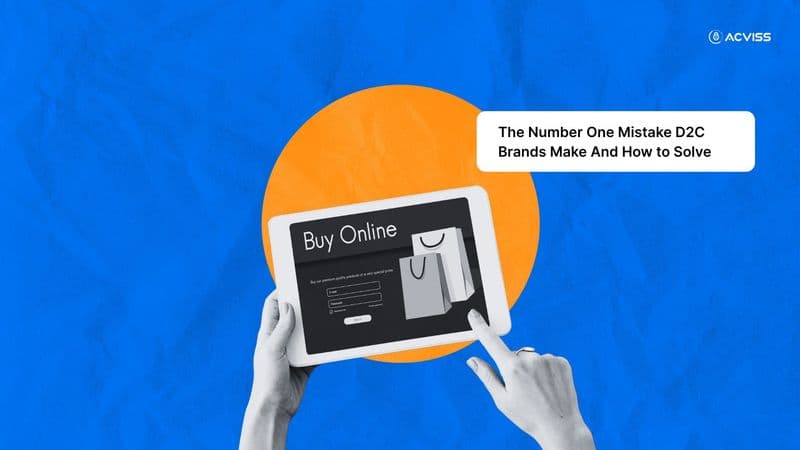The Number One Mistake D2C Brands Make And How to Solve It!

Neglecting a Proper Anti-Counterfeit Solution
Direct-to-Consumer brands have emerged as a dominant force in the retail industry, offering innovative products and personalized shopping experiences. With a market value that could reach $100 billion by 2025. While D2C brands enjoy numerous advantages, such as cutting out middlemen and building direct relationships with customers, they often overlook a crucial aspect of their operations—the implementation of a robust anti-counterfeit solution. This oversight can lead to significant consequences, including compromised brand reputation, loss of revenue and customer trust.
E-commerce: A boon or a bane?
To be fair, e-commerce platforms have been great at promoting small and medium businesses and with the worldwide lockdown and boost in the online shopping culture, these platforms enjoyed the most success than any other retail shop out there. And with this popularity and success came the counterfeiters. Their exploitation of digital shopping sites has most affected the D2C brands which, unknowingly, has caused a downfall in their business.
One of India’s top electronic brands, BoAt has been facing the counterfeit threat since its inception. Being a D2C brand which gained huge support among the youth attracted a lot of attention from counterfeiters as well. The CEO of BoAt himself addressed the situation of fake websites imitating the real one and in February around 10,000 fake websites were identified and removed. These websites sold products at a very low price scamming a lot of customers and not even delivering the product. BoAt had to deal with a long and tiring legal action to bring a temporary cessation to their trouble. This underlies the necessity for an anti-counterfeiting solution.
What happens to D2C brands without Anti-Counterfeit Measures?

If you thought that counterfeiters only target large, luxurious brands, that’s where you are failing. In counterfeiting, scammers don’t differentiate between small or large brands. Of course, popular and widely bought products of renowned brands will be counterfeited most, but it doesn’t mean that other brands are left out by them.
Brands, especially D2C businesses are more prone to counterfeiting because
They are new to the business and lack the resources to counter scammers through legal actions.
They don’t invest in anti-counterfeit solutions, which gives more freedom to counterfeiters to run their businesses.
So what are the setbacks that D2C brands will face if they don’t invest in a proper anti-counterfeit solution?
1. Brand Reputation Damage: Counterfeit products tarnish a brand's reputation by delivering subpar quality, causing harm to consumers, or simply failing to live up to customer expectations. Imagine if you have a great product that has a solid audience base and is ready to hit the market, but before your product reaches the shopping shelves, your counterfeiters are able to sell them.
How would that feel? Even worse how would the customers feel using a product with your name that doesn’t meet the proper security or quality standards?
Negative experiences associated with counterfeit goods can spread rapidly through word-of-mouth and online reviews, leading to a loss of trust in the brand and a decline in customer loyalty. A serious threat that could end your dream business even before you begin.
2. Revenue Loss and Erosion of Consumer Confidence: Counterfeit products divert sales and revenue from legitimate D2C brands. As D2C brands cut out the middlemen and sell directly to the customers, your only source of revenue is from customers. Customers who unknowingly purchase counterfeit items may associate the poor experience with the genuine brand, resulting in lost sales and decreased customer confidence. The inability to differentiate between genuine and counterfeit products creates an environment of doubt and uncertainty among consumers, hindering the growth of D2C brands.
3. Legal Consequences: Selling counterfeit products is illegal in most jurisdictions and can result in legal action against the brand. Intellectual property rights violations, trademark infringement, and other legal issues may arise, leading to costly legal battles and potential financial penalties. Neglecting anti-counterfeit measures exposes D2C brands to unnecessary legal risks that can drain resources and distract from core business objectives.
4. Compromised Consumer Safety: Counterfeit goods often bypass quality control measures and safety regulations, posing serious health and safety risks to consumers. From counterfeit cosmetics containing harmful ingredients to fake electronics with faulty wiring, unsuspecting customers face hazards that can result in injuries or even loss of life. Failing to address this threat compromises the well-being of consumers and can lead to devastating public relations crises.
Investing in a Proper Anti-Counterfeit Solution

Always keep in mind that implementing a robust anti-counterfeit solution is not a luxury; it is an essential investment for D2C brands. Like marketing, anti-counterfeiting is also becoming an inevitable tool for keeping business alive in the market. And with staggering growth in technology such as Artificial Intelligence and Blockchain, there has never been a better time than now.
1. Product Authentication Technologies: Utilizing advanced product authentication technologies, such as unique QR codes, proprietary codes or NFC tags, allows consumers to verify the authenticity of a product. These technologies enable brands to establish a direct connection with customers and enhance trust by providing transparency in the supply chain.
Acviss’s Certify provides each and every product with a unique identity by providing non-clonable and tamper-proof labels integrated into the product or the packaging. The labels have been able to protect over 80 brands across industries and help them overcome their counterfeit worries.
2. Supply Chain Visibility: Maintaining a transparent and secure supply chain is vital in preventing counterfeit products from infiltrating the market. D2C brands should implement comprehensive traceability systems that monitor the movement of goods throughout the supply chain, ensuring authenticity from manufacturing to delivery.
One of the best ways to ensure transparency in the supply chain is to use blockchain technology. Acviss’s Origin has been able to employ blockchain and integrate them with anti-counterfeit tools so that no one can get in or tamper with the products without notifying the brands or the customers. And the plus point is your brand can constantly monitor the product throughout its lifecycle, from raw materials to the distribution stage.
3. Collaboration and Partnerships: D2C brands can collaborate with industry associations, governmental organizations and law enforcement agencies to collectively combat counterfeiting. Sharing information and best practices can help identify emerging trends, implement proactive measures and enforce legal actions against counterfeiters.
4. Omnichannel security: Business has been expanding their channels from offline to online and with the increased usage of social media and e-commerce marketplaces, it is a justifiable and necessary action. But getting your brand and product to a larger audience without direct contact can always be risky considering the amount of counterfeiting in the online world. And it is essential for brands to apply brands need to apply and protect their product both in the online and offline channels.
Acviss’ Truviss is a great tool that uses Artificial Intelligence and Machine learning to scan the domain, social media, apps and products to find fake listings. The interesting feature is that truviss automatically identifies, reports and eliminates any counterfeit products that infringe on the brand’s intellectual property. This helps you to get real-time analytics and identify scams before they happen rather than spending a lot of time, money and effort on legal actions afterwards.
4. Consumer Education and Awareness: It is necessary to know that customers are the first line of defence against counterfeiting. Educating them about the risks of counterfeit goods and providing guidance on how to identify genuine products can play a significant role in minimizing their impact. As D2C brands focus on the e-commerce platforms for sale D2C brands can leverage social media, blogs and educational campaigns to raise awareness and empower consumers to make informed purchasing decisions.
Your Brand's Best Companion!
Failing to invest in adequate measures to combat counterfeit products exposes brands to severe consequences, including reputation damage and revenue loss. This begs for the need for a suitable anti-counterfeit measure. By implementing a robust anti-counterfeit strategy, D2C brands can protect their customers, preserve their brand reputation and ensure sustained growth in the highly competitive marketplace. Prioritizing anti-counterfeit measures is not only a business imperative but also a commitment to the trust and loyalty of consumers.
And Acviss know it! Acviss has been at the forefront of the counterfeit battle, whether it be the online shopping platforms or the offline stores. By leveraging cutting-edge technology like Artificial Intelligence, Blockchain, Machine Learning and computer vision, Acviss’s solutions have not only been able to protect over 2 billion products across every industry but also improve customer engagement and loyalty towards brands.